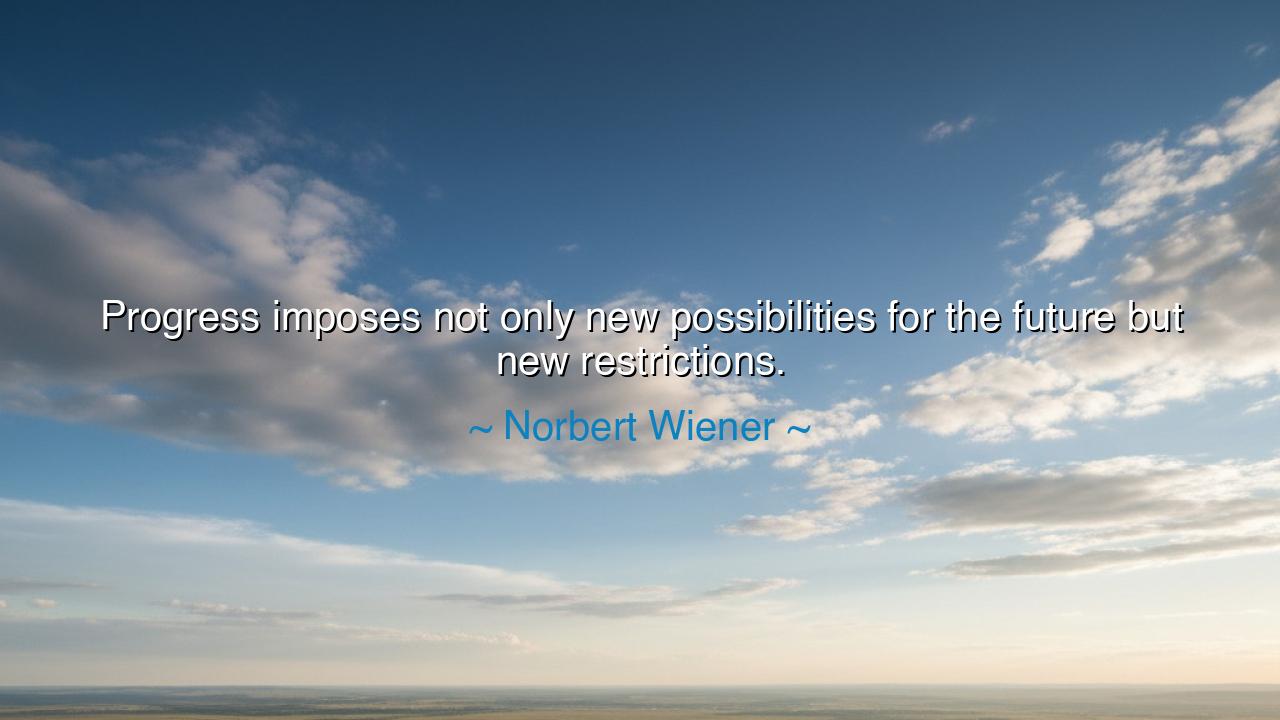
Progress imposes not only new possibilities for the future but






"Progress imposes not only new possibilities for the future but new restrictions." These words, spoken by Norbert Wiener, a visionary mathematician and the father of cybernetics, carry within them a profound truth about the nature of human advancement. We often think of progress as a force that brings about only freedom, opportunity, and improvement, yet Wiener’s wisdom reveals a more complex reality. Every new possibility, every leap forward, often carries with it new limitations—constraints that we must learn to navigate, and, at times, even embrace. Progress is not just the opening of doors but the reconfiguration of the world in ways that demand new forms of discipline, control, and responsibility.
Let us reflect on the wheel, one of the earliest inventions that brought about immense progress in human civilization. The wheel opened up new possibilities for transportation, trade, and innovation, but it also came with a new restriction: the need to regulate how it was used. With the rise of wheels and the mobility they provided came the development of roads, boundaries, and eventually, laws that governed travel and the use of carts and chariots. As the wheel allowed greater movement, it also imposed the restriction of organization—roads to follow, routes to control, and boundaries to respect. Progress, in this case, was not just a path of limitless freedom, but a shift in the structures that governed the way people interacted with their environment.
In more recent times, the advent of technology and the internet provides a striking example of Wiener’s observation. The creation of the internet has granted us unprecedented access to information, global communication, and endless possibilities for connection. Yet, alongside these incredible possibilities, we find ourselves facing new restrictions: concerns over privacy, security, and the control of information. With every new digital tool, there arise challenges related to how we manage and regulate its use. What was once an open frontier is now subject to laws and restrictions that limit our freedom in ways that were once unimaginable. The very tools that grant us power also demand that we navigate their complexities and risks carefully, for with great progress comes the weight of greater responsibility.
Consider the story of Julius Caesar, whose rise to power brought about significant progress for Rome, yet also introduced new restrictions on freedom. Under his leadership, the Roman Empire expanded, bringing wealth and cultural exchange, but with it also came the consolidation of power and the erosion of the Republic’s earlier systems of democracy. Caesar’s ascent imposed upon Rome a new set of limitations: the decline of individual political freedoms and the rise of dictatorship. His progress in expanding the empire came at the cost of the freedoms that were once the foundation of Roman political life. Progress, in this sense, is not without its cost. The more expansive the reach of progress, the more complex the constraints that come with it.
Wiener’s quote also speaks to the dual nature of innovation and responsibility. Technological advancements like the invention of the nuclear bomb brought great power and potential for progress in both energy and warfare. Yet, the very progress in weaponry also imposed upon humanity the restriction of the potential for mass destruction, changing the course of international relations and global politics forever. It is a potent reminder that every step forward comes with the need for new ethics, new laws, and new ways of thinking about how we manage the powerful tools we create. Progress, if unchecked, can lead not to liberation, but to new forms of control, harm, or even destruction.
The lesson here is clear and deeply profound: while we must embrace progress, we must also be mindful of the new restrictions it brings. Every leap forward in human civilization—whether through the wheel, the internet, or the advent of atomic power—carries with it the need for balance, for a measured response to the challenges and dangers that come with innovation. Progress is not a straight line to freedom, but a winding path that forces us to confront the consequences of our actions.
In our own lives, we must approach progress with wisdom and humility. As we strive for advancement, whether in our personal goals, professional achievements, or technological innovations, we must recognize the new responsibilities and restrictions that come with each success. Think carefully about the impact of your actions and creations on the world and the people around you. As you step forward into the future, let it be with the understanding that progress is not just about opening doors, but about learning how to live wisely within the new structures it demands. Engage with the future, but do so with the foresight to navigate the new restrictions it will inevitably impose.






AAdministratorAdministrator
Welcome, honored guests. Please leave a comment, we will respond soon